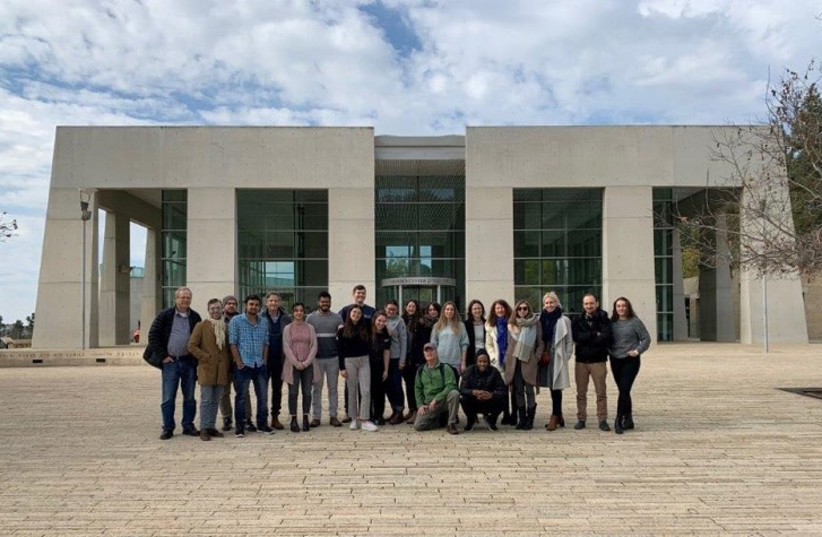Understanding the Holocaust and the development of the Zionist movement is critical to understanding the modern State of Israel. The University of Haifa offers two English-language master’s programs in these significant disciplines.
The Weiss-Livnat MA Program in Holocaust Studies is dedicated to creating and nurturing a new generation of Holocaust researchers and educators. This one-year, three-semester course presents a multidisciplinary study of the Holocaust from several perspectives, including history, anthropology, literature, visual culture, curation and other areas. The multidisciplinary nature of the curriculum, says Anat Weiner, program director, means that students can find something of interest related to their profession or field of interest.
Weiner, who graduated in the program’s third cohort, points out that students from more than thirty countries worldwide enrolled in the program over the past ten years. “They come for different reasons,” she explains. “Some students are descendants of Holocaust survivors and want to explore and research their family stories. Some students are not Jewish and come from different backgrounds.” Weiner adds that every country has its own narrative for the Holocaust, and students learn how to teach the history of the Holocaust in its proper context. For example, students from Cambodia and Rwanda, two countries that experienced their own genocide, are curious to learn about the specter of genocide and reflect on their country’s experience and history.

The international nature of the Holocaust Studies program is unique, says Weiner, as is the fact that the University of Haifa has connections with various Holocaust research institutions in Israel and around the world. Recently, the university initiated a new course in digital humanities and the Holocaust, which resulted from its cooperation with the United States Holocaust Memorial Museum in Washington, DC. This course instructs students on new methods of conducting Holocaust research utilizing new technologies, which will be the basis of future research.
The Holocaust Studies program also offers a course in entrepreneurship and innovation, which gives students tools to connect the field of Holocaust commemoration and education with new initiatives. Holocaust survivors, scholars and film directors visit the program and speak with students, and additional content is added that provides enrichment.
Many graduates of the program have pursued Ph.D. studies, while others become Holocaust educators in schools and organizations. Some graduates find employment in museums and at memorial sites. “We make sure as a program,” concludes Anat Weiner, “to nurture our students and keep in touch with them, even after they have finished their studies. We maintain contact with them through different online groups and communities and help them with professional development and networking.”
While the Holocaust Studies program plumbs the depths of the past, the University of Haifa’s MA program in Israel Studies program enables students to partake in an in-depth study of the State of Israel, from the beginning of the Zionist movement to the present day. It reveals the theoretical underpinnings of the Zionist project, the communities of the Jewish diaspora and their relationship to the modern state of Israel, and the deep complexities of Israeli society in light of its multicultural character.
The MA Program in Israel Studies is designed to attract international students who wish to deepen their understanding of the Israeli experience from a broad perspective and see it against the larger backdrop of twentieth-century Jewish history and Middle Eastern politics and society. It examines Israeli history and society from a variety of perspectives, including migration, economics, politics, culture, religion, and the ties between Israel and Jewish communities abroad. The program offers a comprehensive academic program, which features a dynamic curriculum combining concurrent study in the classroom and the field. Classroom studies are integrated with faculty-led field trips to historical and archaeological sites, kibbutzim, archives and historical museums, as well as encounters with representatives from the different sectors that make up Israeli society: Palestinian-Israelis, Druze, national-religious Jews, ultra-Orthodox, new immigrants, residents of development towns, kibbutz residents and the veteran population. The tours allow students to become acquainted with Israel’s society, history, landscape and geography.
Participants in the MA program will learn about significant trends in Zionist ideology and its key thinkers, the evolution of the Zionist ideas over time and the criticism and internal debates that have accompanied Zionism from its inception. Students will learn how the Yishuv (the Jewish community in Palestine) and later, Israeli society, was consolidated through succeeding widespread waves of immigration, starting with the period of the first Aliyah until the first two decades of the State of Israel. The program continues with an examination of contemporary Israel of today within the context of modern Jewish and Israeli history.
The MA program in Israel Studies is designed to provide students with the knowledge and research skills required at a doctoral level. It is of great value for students seeking to pursue a career path in journalism, education, diplomacy, tourism, involvement in Israeli/Jewish organizations and other fields which require specialization in Israel, Middle Eastern and Jewish studies.
Visit the school’s Website to learn more: The University of Haifa
This article was written in cooperation with the University of Haifa
